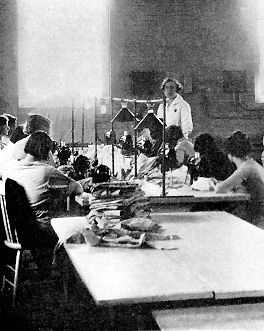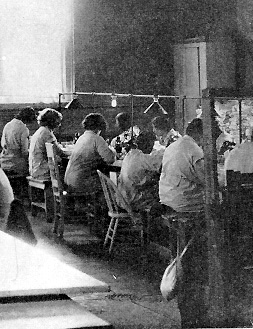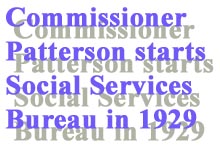In the early part of the year the
Department began the organization of a social service bureau by appointing Miss
Elizabeth R. Butler, social worker at the 2nd District Prison. In the latter
part of the year Mrs. Margaret R. Millar was appointed social worker at
the Workhouse on Welfare Island.
It was subsequently decided to transfer Miss
Butler to Welfare Island under the direction of Mrs. Millar who, because of the
excellence of her work, was made Social Service Director of the Department. The
social service bureau at the present time consists of these two and Mrs. Ceil
Lifton, who acts as secretary and assistant to Mrs. Millar.
The social service bureau was in
the nature of an experiment, but in the few months in which it has been functioning
it has proven its worth and the necessity for its existence many times over.
Many of those who go to penal institutions, particularly for the first time,
are not real criminals in the ordinary acceptation of that term, but those who
yielded to an impulse to do wrong or because of circumstances which appeared
beyond their control at the time.
Many of these inmates feel completely
isolated and friendless after the prison gate closes upon them. They are
worried about themselves, their families, their jobs and their business affairs
generally. It does not take an inmate long who feels that no one has any
interest in him to become embittered against the society which imprisoned him.
It was for the purpose of alleviating this feeling of forlornness in some
measure and of doing what we could to maintain a liaison between the inmate
and the outside world that the social service bureau was organized.
 |
Sewing Room, Correction Hospital (Workhouse), Welfare Island. (Left half of photo on Page 88 of 1929 annual report.) |
Our social
workers interview the prisoners, ascertain their family, educational,
environmental and employment background where necessary, see that their
indigent families are taken care of by some organization, endeavor to effect
reconciliations between prisoners and their estranged families where
families are of good repute, and generally endeavor to make the inmates feel
that the Department is taking some interest in them other than merely trying to
keep them from escaping.
As has been stated, this bureau
has been a success almost from its inception. Perhaps the most enthusiastic
advocate of the bureau is the warden of the Workhouse, who states that it has
contributed more than any other agency to raising the morale of the inmates of
his institution. It must be remembered that many of the inmates who come to our
institutions are ignorant of their rights, and even where they are cognizant of
the fact either that they have been imposed upon or that it might be possible
for them to secure help out of their difficulties, they are too inarticulate to
make their real situation known.
It is necessary in many instances to
cultivate them over a considerable period of time in order to gain
their confidence, as they are suspicious of anyone representing authority. Due
to the fact that our social workers are in intimate contact with them every
day, and the further fact that the story of how one has been helped flashes
from one to another, the inmates soon come to look upon the social worker as a friend
and to voluntarily cooperate with her in the solution of their troubles.
When Mrs. Millar was first
appointed a meeting was arranged to which officers representing various social
service organizations throughout the City were invited to meet her. The purpose
of the Department in starting the bureau was explained and the various
representatives present pledged their cooperation and support. This has been
given in full measure, and the social service bureau works at all times in
perfect harmony with various organizations throughout the City.
Where necessary
cases are referred to various other organizations such as the Charity
Organization Society, Jewish Social Service, Association for Improving the
Condition of the Poor, Women's Prison Association, Catholic Charities, the Big
Sisters, the New York Association for the Blind, and similar organizations.
 |
Sewing Room, Correction Hospital (Workhouse), Welfare Island. (Right half of photo on Page 88 of 1929 annual report.) |
Any
number of unusual matters are attended to which are of assistance to the inmate
and in which she is unable to help herself, as for instance, the collecting of
money due her from employers, recovering clothing which they have left at home,
attending to the signing of insurance papers and other matters of a similar
nature.
Some idea of the character of the
work being performed by the social service bureau may be gained from the report
for the month of December of this year, which shows 107 interviews with
inmates, 6 interviews with friends and relatives, 10 visits to homes, 16 cases
referred to outside organizations, 6 cases of clothing recovered, 3 cases of
employment secured and numerous other activities.
In many, if not the majority
of cases, had there been no social service bureau, no action in all probability
would have been taken and the inmate would have remained estranged from her
family, or secured no employment and taken to stealing or have failed to secure
money which may have changed the entire current of her life upon her release.
In many cases girls are returned to their families even when the latter live in
other states and cities. . . .
[The middle part of this Social Services Bureau section of the 1929 annual report was devoted to six case histories illustrating the work of the new unit.They recounted assistance given to inmate families with immigration, employment, health, child-caring, housing and personal relationship problems.]
The Department feels that it will
be generally agreed that work of this nature is decidedly worthwhile, not only
for the sake of the unfortunate individual whose life is changed for the
better, but also, and what is far more important, in the effect which such work
has in diminishing crime, as many of these people would in all probability have
continued their anti-social careers.
Husbands, children and other relatives
have been located. Reconciliations have been effected. Clothing, personal
belongings and household goods have been recovered and taken care of for
prisoners. Jobs have been obtained and money due penniless inmates collected
for them.
This work is not completed in the
institution, as the social workers endeavor to keep in touch with inmates after
their release unless they have been turned over to some other organization. As
the work develops, a realization of what has necessarily been left undone is
overwhelming.
The possibility of tremendous achievement shows itself more and
more, one that promises results not only to the individual prisoners but also
to society. There will be failures of course, but there will be many of these
women who will respond to the new opportunities given them for rehabilitation
and readjustment and who will never return to serve another prison term.
So far, the salary and other
expenses incidental to the administration of this bureau have been paid out of
the profits of the Inmates Commissary, a semi-official organization which
furnished to prisoners various articles of food and clothing which are not
provided by the City. The City, of course, is receiving all the benefit. In
next year's budget we are asking for two additional social workers, these to be
paid out of City funds. It is most earnestly urged that this request be
granted.
Nothing that the Department is doing is of more vital importance than
the work that is being carried on by this bureau. It is giving the human touch
to the prisons and assisting in the solution of the human problem comprehended
therein which has been ignored by prison administrations and society generally
for so many years.
It is proving specifically and by actual cases that it is
possible, by the display of a little sympathetic and intelligent interest and
understanding, to turn the anti-social;even those who have pursued
that line of conduct for many years,into paths which will make them
useful citizens instead of parasites.
|
![[DOC Shield]](../gif/shld3.jpg)

![[Richard C. Patterson]](../gif/rcpbio2.jpg)
![[DOC Shield]](../gif/shld3.jpg)

![[Richard C. Patterson]](../gif/rcpbio2.jpg)
![[DOC 1919 report cover]](../gif/rcp29rpt2.jpg)